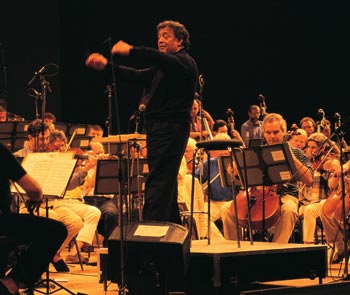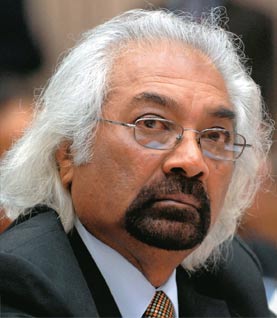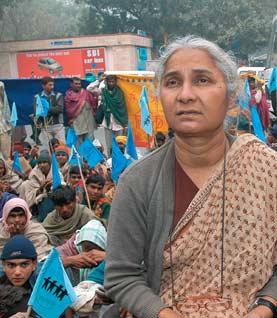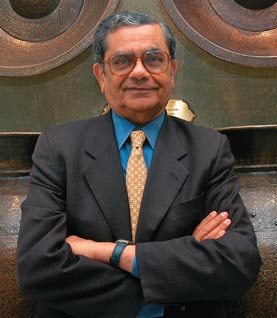
Stories of extreme hardship, braving impossible odds and innumerable sacrifices, abound in the lives of nearly 90 per cent of the students in the country. But among them, some perform exceptionally well. Their academic laurels are so brilliant, that at times their CV looks intimidating. And each one acknowledges that it's the right education that made them what they are today. Careers360 identified 40-odd brilliant students of this country. Most of them came from very dire conditions.
Here, in the third part of the series we feature Zubin Mehta, Sam Pitroda, Medha Patkar and Jagdish N Bhagwati.
Zubin Mehta
Conductor of the Israeli Philharmonic Orchestra
Music Director of the Bavarian State Opera (1998-2006)
Conducted at Metropolitan Opera New York, the Vienna State Opera, the Royal Opera House, Covent Garden, La Scala Milan, and the opera houses of Chicago and Florence as well as at the Salzburg Festival
Zubin Mehta was exposed to Western classical music even before he could speak. At the age of two, his cherished possessions were a pair of drum sticks (kept under pillows). From the age of nine, he listened to his records every day, and learned all the symphonies, and honed his musical skills on his own. He gave up medicine at the age of 18, and despite financial constraints, the Mehtas sent him to Vienna's prestigious Academy of Music to pursue his real passion -- music.
He quickly went on to conduct the Vienna and Berlin Philharmonics, and at 26, he became the youngest permanent conductor of the Los Angeles Philharmonic Orchestra. Mehta graduated in 1957 and had to wear a full dress suit to conducting a concert, as part of the final examination. Still financially broke, he bought a passable substitute for $25 from a place where waiters purchased their uniforms. He often wore mismatched shoes, as the others had holes in them. His ability as a conductor has now enabled him to perform in almost all the leading music halls of the world.
Did you know...
Awards
Part I: Education made him: Dr Manmohan Singh
Part II: Kiran Bedi, CV Raman, Shyam Benegal, P Venugopal
Part III: Homi Bhabha, Arun Sarin, Rabindranath Tagore, Hafeez Contractor
On the next slide: The career of Sam Pitroda

Responsible for India's communications revolution
Chairman, WorldTel
MSc (Physics & Electronics)
MTech ( lllinois)
Satyanarayan Gangaram Pitroda grew up in Titlagarh, a tribal village in Orissa, which had no piped water, electricity, schools or radios. His father, a migrant from Gujarat, who was educated only up to Class 4, nurtured the desire to make his children literate. So he sent him and his brother to school in Baroda.
Sam completed his schooling from Vallabh Vidyanagar in Gujarat and finished his Master's in Physics and Electronics from The Maharaja Sayajirao University of Baroda. As an energetic youth, Sam was deeply influenced by the US President JF Kennedy and America beckoned. But he was cash-strapped. So he procured a loan from the Orissa government, and took a boat from Mumbai to Genoa (Italy), a train from Genoa to London, a plane from London to New York and a bus from New York to Chicago.
He got a Master's in Electrical Engineering from the Illinois Institute of Technology in Chicago. On his father's initiation, he began a business called Wescom Switching with two friends in Chicago area in the early 1970s. Rockwell International bought it in 1979, and the sale earned Sam, a guy who never had money, a lot of money which he didn't know how to spend. So, he made a trip to India -- just to visit.
When he placed a call to his wife from a five star hotel to Chicago, the connectivity was very poor. He decided to fix it and India's telecom destiny changed forever. He aspired to meet with the then Indian prime minister, the late Mrs Indira Gandhi but turned down a 10-minute appointment given to him. Instead he sought an hour, saying that he can't do much in 10 minutes. 89 months later he got the appointment.
He flew in from Chicago and gave her a presentation, and eventually this led to the formation of the Center for Development of Telematics in 1984. India's telecom destiny changed forever.
Did you know...
Awards & Honours
On the next slide: The career of Medha Patkar

Social activist and reformer
MA in Social Work, Tata Institute of Social Sciences (TISS)
After earning an MA in Social Work from TISS, Medha Patkar began her career working with voluntary organisations for some years before joining TISS as faculty and began working on her PhD.
But in 1985, she along with a few of her colleagues from the institute took a trip to the Narmada Valley region and found that the Sardar Sarovar programmes, was temporarily suspended at the request of the Ministry of Environment. Listening to the people, Patkar learned that the only information they were given was that the dams would be built and people in the area would be rehabilitated or displaced. She became so deeply immersed in the issue that she shunned her PhD, and became a full-time activist for Narmada Andolan Bhachao organisation.
She almost died during a 22-day hunger strike in 1991. Undaunted, she undertook two more protest fasts in 1993 and 1994. She and her organisation later filed an unsuccessful case in the Indian Supreme Court to stop the construction of the dam. As an outgrowth of her work to stop dam construction, Patkar helped establish a network of activists across the country called the National Alliance of People's Movements (NAPM).
Awards & Honours
On the next slide: The career of Jagdish Bhagwati

Economist & Professor, Columbia University
BA, Economics, Cambridge University, 1956
PhD, Economics, Massachusetts Institute of Technology (MIT), 1967
Bhagwati, known for his research in international trade and for his advocacy of free trade, was born into a family with abundant intellectual achievement. He was raised in Mumbai, where his father brought up 10 children, and was always short on money. He left for Cambridge University at the age of 19 on a scholarship.
Over the last three decades he made significant contributions to the field of migration and immigration policy. He extended his scholarly research and public policy writings to virtually all questions raised by international migration.
Books
Awards